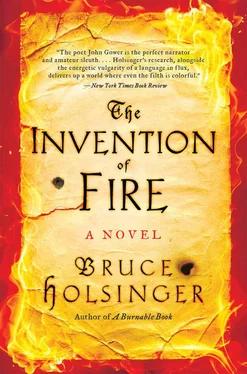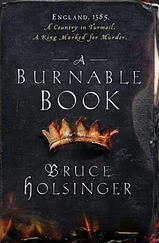Bruce Holsinger - The Invention of Fire
Здесь есть возможность читать онлайн «Bruce Holsinger - The Invention of Fire» — ознакомительный отрывок электронной книги совершенно бесплатно, а после прочтения отрывка купить полную версию. В некоторых случаях можно слушать аудио, скачать через торрент в формате fb2 и присутствует краткое содержание. Год выпуска: 2015, Издательство: HarperCollins, Жанр: Исторический детектив, на английском языке. Описание произведения, (предисловие) а так же отзывы посетителей доступны на портале библиотеки ЛибКат.
- Название:The Invention of Fire
- Автор:
- Издательство:HarperCollins
- Жанр:
- Год:2015
- ISBN:нет данных
- Рейтинг книги:3 / 5. Голосов: 1
-
Избранное:Добавить в избранное
- Отзывы:
-
Ваша оценка:
- 60
- 1
- 2
- 3
- 4
- 5
The Invention of Fire: краткое содержание, описание и аннотация
Предлагаем к чтению аннотацию, описание, краткое содержание или предисловие (зависит от того, что написал сам автор книги «The Invention of Fire»). Если вы не нашли необходимую информацию о книге — напишите в комментариях, мы постараемся отыскать её.
The Invention of Fire — читать онлайн ознакомительный отрывок
Ниже представлен текст книги, разбитый по страницам. Система сохранения места последней прочитанной страницы, позволяет с удобством читать онлайн бесплатно книгу «The Invention of Fire», без необходимости каждый раз заново искать на чём Вы остановились. Поставьте закладку, и сможете в любой момент перейти на страницу, на которой закончили чтение.
Интервал:
Закладка:
The offices of the captain of Calais were situated in the castle’s second-floor gallery. I was led through the adjoining rooms of clerks and secretaries, speaking in hushed tones, the bureaucratic hum of an office well run.
In addition to his duties as captain of Calais, Sir William Beauchamp, the Baron Bergavenny, served as the crown’s envoy to Flanders, and was thus a powerful figure in the king’s diplomacy. Beauchamp was also the younger brother of the Earl of Warwick, standing just outside that innermost circle of lords making trouble for King Richard and the chancellor in the Parliament that fall. He was a catlike man, small of face, his movements and his speech careful and calculated. I had met him several times, once in quite unpleasant circumstances, and he had impressed me with his ability to appear elusive and straightforward at the same time.
His chamber was modestly furnished, with a single window looking out on the fortifications below. On the opposite wall hung a shield emblazoned with his family’s arms, a bold gold band differenced with a crescent sable. His greeting was cursory but not rude as he waved me in.
“You chose not to return to Westminster for Parliament, my lord?”
He moved a lean arm slowly across his desk. “I have an island to defend, Gower, and against a force the likes of which England hasn’t seen since King William sailed from Normandy. Thousands of ships a few leagues north of here, massed along the fjords and in the sea, ready to fly like so many darts into the breast of the realm. Calais will be the primary agent of defense by sea. Its captain can hardly spare a fortnight for politics.”
“Of course not, your lordship,” I said. “Though in this season, politics seems to be eating more than its share of fortnights.”
A slight smile. “So says my brother the earl. He wishes me to return to London before Exton’s riding, which he will be accompanying along with Gloucester. He claims that London could use the additional livery.” The king would often use such civic rituals to show a pretense of solidarity between the realm’s various factions, now fighting like dogs and bears in a Southwark cage. A day of feigned peace, years of ferocious rivalry set aside for a few hours of shallow ceremony. Yet if the Duke of Gloucester and the Earl of Warwick were among the lords leading the Riding, it was not difficult to foresee an ugly clash marking the new mayor’s official assumption of office.
“I trust his lordship the earl will allow for your absence, my lord.”
“He will have to,” said Beauchamp. “And what will Suffolk do on that momentous day, do you suppose?”
“That is up to the earl, my lord.”
“It is good to know that you have the trust of the lord chancellor, Gower,” he purred. “Michael de la Pole’s word is the very mint of Westminster.”
This was dangerous ground. As belted earls Gloucester and Suffolk were equal in rank, though the chancellor’s elevation was more recent, and he was regarded as something of a usurper by the king’s opponents. To show too much enthusiasm for Michael de la Pole in Beauchamp’s presence would not be helpful. Before I could shape a suitable reply he came to my aid.
“The chancellor must go, Gower. There is no other way. He is being impeached even as we sit here.”
The observation had been made in an easy but uncompromising tone, and despite all I had been hearing back in London and Westminster it was only in that moment that I truly understood the inevitability of the earl’s ouster.
“May the next chancellor fit the office with the same dignity he has shown, my lord,” I said, risking a small and final show of loyalty.
Beauchamp allowed it, moving on gracefully to the apparent object of my visit. “This incident-this atrocity-has roused me, Gower. Here I am, doing what I can to keep the peace in this region, and a massacre takes place under my nose.” He wriggled it, as if to sniff out the perpetrators. I could almost imagine whiskers. “The burgesses are in a heating roar, to say nothing of the Hainaults, lords of Le Quesnoy. We have powerful garrisons at the castles of Oye, Marcke, and Guisnes. I have paid spies in nearly every village in the Pale. Yet I got no wind of this until the deed was done. I have sent my sheriffs down there, along with the coroner of Calais, but there’s no sense of who these men might have been, or where they went once they shot up the town. The gunners seem to have appeared as if by magic out of the woods, then dissolved back into the trees once they’d murdered half the market.”
“They like the forest,” I said, almost to myself.
“What’s that?” he said sharply.
“They have done this before, my lord.” I described the discovery in the Walbrook, though left the connection with Gloucester and the Tower unmentioned.
He in turn told me what he knew about the killings at Desurennes and the progress of his sheriffs’ investigation. “You will want to begin with Pierre Longel, a witness. The old man was selling cheeses that morning up against the walls. He was not injured, though he saw several next to him killed and maimed-including his grown son. He was a soldier upon a time, and I’m told he has good information about the nature of these weapons and the tactics of the offending squad.”
“Very well,” I said, and thanked Beauchamp for his assistance. I had just turned at the door to his chamber when I was seized with a strange and sudden desire. “I have one last question, your lordship. Or rather a request.”
“What is that?” said Beauchamp.
“I see that your defenses include large cannon. Bombards, culverins, and the like.”
“What of them?”
“Do you keep handgonnes in your arsenal?”
He moved slightly, then pawed a cheek. “Are you suggesting that the Calais garrison was responsible for this massacre?”
“Not at all, my lord.”
“Then what do you want with our hand cannon?”
“With your permission, I would like to see one fired.”
“A singular request.”
I inclined my head. “It is that, my lord.” I asked more out of curiosity than necessity, having developed a keen interest in the workings of the handgonnes. For weeks I had been tracking down the men who had employed the newfangled weapons against the victims found in the sewer channels, and now, it seemed, against the market crowd on this side of the sea. I had yet to hold one of these weapons myself, or witness one employed in firing.
“I see no virtue in these weapons,” Beauchamp mused. “Clumsy, loud, the opposite of stealth. They take an eternity to reload, cannot be aimed with any reliability, and are as likely to explode in a man’s face as kill his enemy. Their only use, as far as I can see it, is to awe our enemy into submission with their noise and fire.”
“Surely they are being refined by His Highness’s armorers.”
“Not that I have witnessed, though there are rumors.”
“Rumors, your lordship?”
“There is talk of clever inventions, unforeseen developments at the Tower. One of my lieutenants has heard whispers of a new gun they have called ‘the Snake.’ A more lethal weapon than our rough tubes, and more efficient, or so it is claimed.”
“The Snake,” I said, intrigued by the designation. “What distinguishes them from the guns you have here?”
“That is unknown to me.” He stood. “I see no reason not to honor your wish, given the distance you’ve come and the task you’ve set yourself. Let me see what we can prepare in short order.”
“I thank you, my lord.”
“It’s less than nothing.” He led me out into the gallery, where he summoned one of the guards waiting against the doors into the upper hall. “Smithson,” he called, snapping his fingers.
Читать дальшеИнтервал:
Закладка:
Похожие книги на «The Invention of Fire»
Представляем Вашему вниманию похожие книги на «The Invention of Fire» списком для выбора. Мы отобрали схожую по названию и смыслу литературу в надежде предоставить читателям больше вариантов отыскать новые, интересные, ещё непрочитанные произведения.
Обсуждение, отзывы о книге «The Invention of Fire» и просто собственные мнения читателей. Оставьте ваши комментарии, напишите, что Вы думаете о произведении, его смысле или главных героях. Укажите что конкретно понравилось, а что нет, и почему Вы так считаете.












